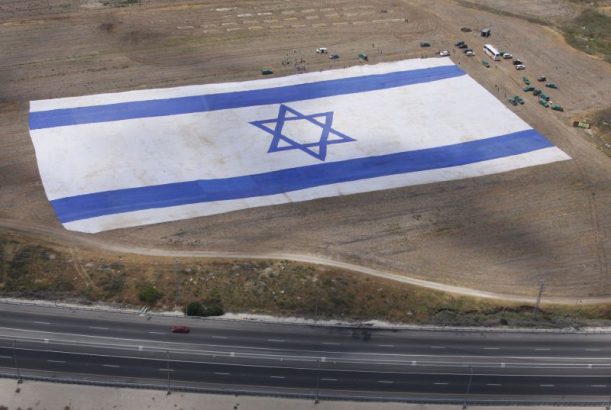In a chaotic and morally obtuse situation, little understood by outsiders, Israel must still try to follow the Divine example of loving humanity, argues Ed Rettig of Rabbis for Human Rights.
At its core, Israel is a human rights project. It is a nation of people who sought to protect their human rights when every internationally recognized method had failed miserably in the Holocaust. In one of its widely forgotten and vital functions, Israel gave a home to most of the ethnically cleansed Jews of the Muslim world, a majority of the survivors of the Shoah, and the bulk of the Jews who fled the former USSR. It is today probably the largest Jewish community in the world. The recent remarkable rescue of what will likely be the final group of 17 Jews from war-torn Yemen reminds us of the deeper meaning of the Israel project.
On the other hand, the Occupation of the West Bank is Israel’s greatest human rights challenge. Yes, we can ask who is to blame for the Occupation and who really causes it to persist. These are important questions. But the answers do not allow us to evade the human rights challenge posed by this abnormal situation of occupation.
That challenge is not easy to meet.
The Palestinan Authority on the West Bank is far from conducting its affairs in a democratic fashion. Viewed from the perspective of Israeli and Jewish concerns, the bet on Palestinian democracy emerging from a peace accord seems a risky one. One popular formula for ending the Israeli control over the Palestinians is a withdrawal from the West Bank. But promoting such a step without guarantees of security and deep mutual recognition could see Hamas or Jihadi forces fill the vacuum. This is not a cynical excuse for the continuation of the occupation but one example of the genuine and reasonable fear of millions who support peace and the end of occupation. Ours is a chaotic and morally obtuse situation, little understood by outsiders. Meanwhile , Gaza is ruled by a dictatorial, anti-democratic, bigoted and violent Hamas. Closer to home, here in Kfar Saba, this Israeli Jew now carries pepper spray and a walking stick for self-defense. And I can testify that empathy towards knife-wielders or those who cheer them on is not a natural emotion, not for me or anyone I know.
Here we see the human rights dilemma of the situation in a nutshell. It faces us with the challenge of its complexity. There is no clever policy, no easy-to-take action that can simply magic away these realities. Nevertheless, we must not allow the Israeli discussion of human rights to end with the recognition of the Palestinian obstacles it faces. Democracy, for Israel, is not an option. Only democracy can produce the vitality Israel needs to survive in the harsh realities of the Levant. For that reason, to engage with questions of Israel’s provision of human rights is to struggle on behalf of the very viability of the State of Israel.
On the other side of the Green Line, Rabbis for Human Rights deals with a broad scope of issues. We face acts of violence by some settlers, often immoral confiscation of land from Palestinians, ill-spirited destruction of EU-financed solar-electric generators donated to the poorest of the poor, attempts to interfere with the financially crucial Palestinian olive harvest, and many other misdeeds often aimed ultimately at mass dispossession. Whatever the violence perpetrated by Palestinians, these acts call us to oppose them, lest we fail the test of carrying the responsibility of being created in God’s image.
Israel ignores the struggle for human dignity at grave moral peril. In the ‘Ethics of the Fathers,’ a collation of aphorisms redacted around the Second Century CE, Rabbi Gamaliel the son of Rabbi Judah the Prince said: ‘in a place where there are no human beings, you try to be human.’ The moral chaos of our surroundings does not diminish responsibility to ‘be human,’ to act in the knowledge that we are responsible for our moral character. The key to this grim, existential approach to our morality in a dangerous situation lies in our capacity for compassion. Rabbi Akiba taught us: ‘Beloved is Humanity, created in God’s image … as it is written [Gen. ix. 6]: “For in the Image of God made the Divine humanity.”’
For us, this is the key. We must try to follow the Divine example of loving Humanity. Because God created us in the Divine image we are brought to the struggle for the rights of working men and women, for gender equality, and for the rights of Israeli citizens within the Green Line to equal treatment by the government. A solution to the challenge of ending the Israel-Palestine conflict may be beyond us. However, that does not release us from the responsibility to act on a smaller scale to do the right thing. Indeed, the intractability of the conflict increases the urgency with which we need to work on relating to our Palestinian neighbors as humans made in the image of God.


































Edward Rettig and Rabbi for Human Rights are both missing the heart of of the issue. They fail to place much more emphasis on the Palestinian people’s continuing stated efforts to destroy Israel. The so called “occupation” is the only option while the Palestinians refuse to first change their textbooks, fomenting hatred from youth, and then negotiate for peace. Why aren’t you spending more of your energies on that? Both other quotations from rabbinic sources and world morality stress that those besieged by constant terrorism and death, must have the right to protect and defend themselves. Leaving the West Bank at this time is an open invitation to a Hamas takeover, preferred by most Palestinians, and more rockets, tunnels and death. How can you ignore that?